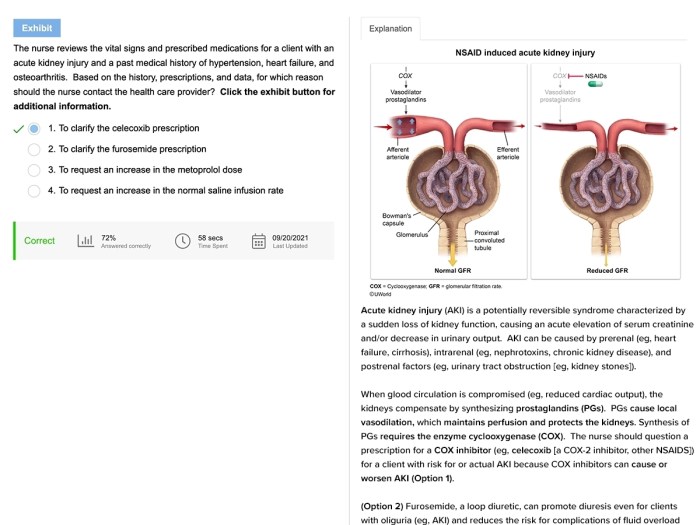Acute kidney injury nclex questions – Acute kidney injury (AKI) NCLEX questions are a crucial aspect of nursing examinations, demanding a thorough understanding of the condition. This guide delves into the complexities of AKI, providing a comprehensive overview of its definition, causes, clinical manifestations, diagnosis, management, and nursing care.
Understanding AKI NCLEX questions empowers nurses with the knowledge and skills necessary to effectively assess, diagnose, and manage patients with this condition, ultimately improving patient outcomes.
Acute Kidney Injury (AKI) Overview: Acute Kidney Injury Nclex Questions

AKI is a sudden decline in kidney function characterized by a rapid increase in serum creatinine levels and a decrease in urine output. It can occur in both acute and chronic forms, with acute AKI being the more common type.
Causes and Risk Factors of AKI, Acute kidney injury nclex questions
- Prerenal factors: conditions that reduce blood flow to the kidneys, such as dehydration, sepsis, and shock.
- Renal factors: conditions that directly damage the kidneys, such as glomerulonephritis, pyelonephritis, and drug toxicity.
- Postrenal factors: conditions that obstruct the flow of urine, such as urinary tract obstruction, prostate enlargement, and kidney stones.
Examples of Conditions Leading to AKI
- Sepsis
- Hypovolemia
- Glomerulonephritis
- Drug toxicity (e.g., aminoglycosides, NSAIDs)
- Urinary tract obstruction
Question Bank
What is the primary cause of AKI?
Ischemia, resulting from conditions such as hypovolemia, sepsis, and major surgery.
What is the most common sign of AKI?
Oliguria, or decreased urine output.
What is the primary nursing intervention for patients with AKI?
Monitoring fluid balance and electrolyte levels to prevent complications.
